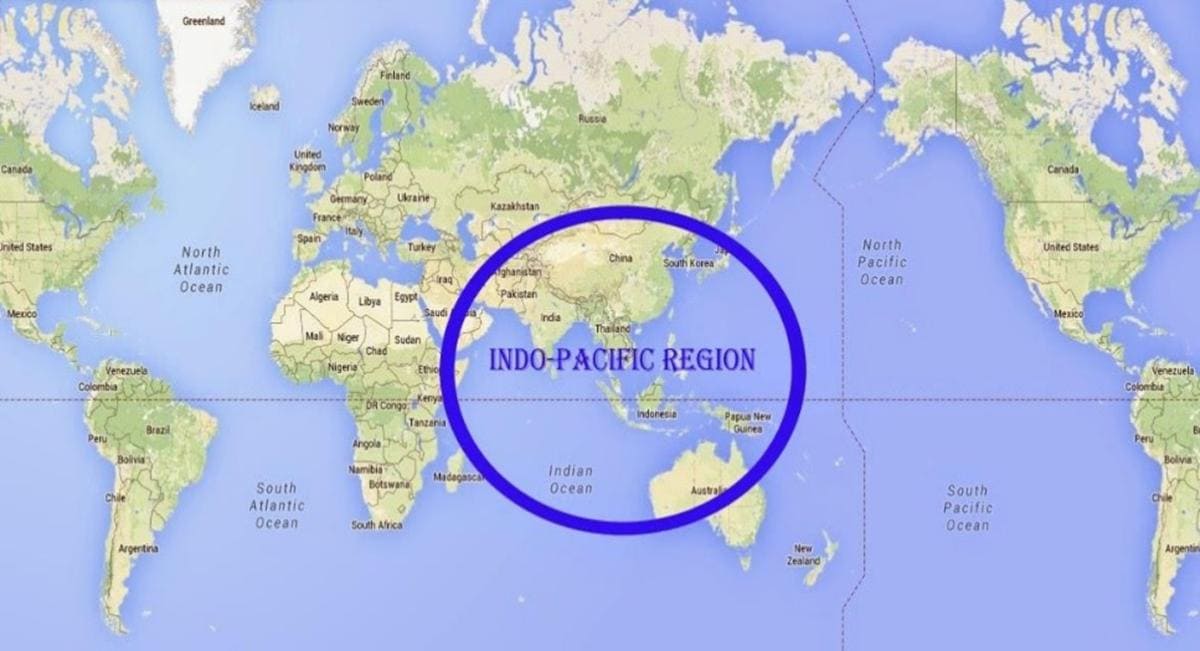On May 2,2022, Xu Bu, president of the China Institute of International Studies, and Chen Wenbing, special researcher at the Xi Jinping Thought on Diplomacy Research Center, published an article in Guangming Daily titled "The 'Five Deadly Sins' of the United States and NATO's Adherence to the Cold War Mentality." According to the two Chinese experts, under the banner of promoting regional cooperation, the United States is playing "geopolitical games" in the Asia-Pacific region. However, the two experts believe that the U.S. should accept "no longer controll[ing] international affairs alone." "The United States should follow the general trend of history and world development and actively promote the reform of the global governance system, but the United States is still indulging in the dream of hegemony," they wrote. The two experts concluded that China "must resolutely oppose" the U.S. attempt to create a "new Cold War" in the region through its "Indo-Pacific strategy."

(Source: Thenewsnow.co.in)
Below is the article:[1]
The First Sin: "Hegemonism"
"The history of the United States is a history of hegemony. The 13 North American colonies had an area of only 800,000 square kilometers when they declared their independence; since then, after the war against Britain, the signing of treaties with France, the Spanish-American War, and the Mexican-American War, the area of the United States expanded to 9.37 million square kilometers. After World War II, even more so did the United States rely on its superior military power by establishing hundreds of military bases around the world. The United States foreign strategy pursues power politics and hegemonism based on strength. It asserts itself as the 'police of the world,' excludes and suppresses dissidents, and attempts to maintain its military, political, and economic hegemony in the world. The United States has also frequently placed domestic law above international law and exercised 'long-arm jurisdiction' over other countries, bringing serious economic difficulties to the countries concerned.
"The United States launched a military attack on Afghanistan in 2001 under the banner of 'counterterrorism.' The 20-year war in Afghanistan has cost trillions of dollars, killed more than 240,000 people, and displaced more than 10 million people. In August 2021, the United States withdrew hastily from Afghanistan, leaving behind a terrible mess. The 'Kabul Moment' is comparable to the 'Saigon Moment.' In 2003, without the authorization of the United Nations Security Council, the United States used a small vial of white powder as 'evidence' of chemical weapons to launch a war against Iraq, which also ended in failure. The strategic failure of the United States in Afghanistan and Iraq shows that hegemonism and power politics are the most destructive forces for world peace. No matter how powerful a country is, it cannot depend on its hegemony to control other countries, let alone dominate the world.
The Second Sin: "Eastward Expansion Of NATO"
"After the end of the Cold War, NATO, instead of disintegrating like the Warsaw Pact, became a tool for the United States to seek to establish a unipolar world and form opposing military blocs. In order to maintain its hegemony, the United States needed to use NATO as a military tool to contain Russia and continue to control Europe in the name of 'security.' Since its first eastward expansion after the end of the Cold War in 1999, NATO has expanded eastward for five consecutive rounds in 21 years, increasing its membership from 16 countries to 30 countries, and advancing its eastern border thousands of kilometers closer to Moscow. NATO ignored Russia's security concerns, deployed a large number of offensive strategic weapons to Eastern Europe, strategically squeezed Russia, and continuously ate away at its security space, forcing Russia to have no choice but to counterattack.
"The United States and NATO are keen to escalate tensions and provoke confrontation. U.S. President Joe Biden delivered a speech in Poland when he visited Europe in March this year, touting the West's 'victory' in the Cold War and vigorously exaggerating ideological confrontation. U.S. Defense Secretary Austin stated after his visit to Ukraine recently that the United States will continue to do everything possible to provide Ukraine with weapons to help Ukraine win the war against Russia. So far, the United States has pledged to provide Ukraine with about $3.7 billion in security assistance. On April 28, Biden asked Congress to approve a total of $33 billion in 'emergency supplemental funding for fiscal year 2022,' which will be used for 'military and security assistance to Ukraine and support cooperation between the United States and NATO Allies to strengthen security in Europe.' The funding may be as high as $20.4 billion. This kind of action by the United States is the primary cause of the escalating crisis in Ukraine.
SUPPORT OUR WORK

International observers have long been keenly aware of how the United States and NATO conduct bloc confrontation in Europe. In 1998, when the US Senate approved NATO's eastward expansion plan, George Kennan, the 'father of containment,' pointed out that NATO's eastward expansion 'will be the deadliest mistake the US has made in the post-Cold War era.' Other strategists, such as Kissinger and Brzezinski, also pointed out that expanding NATO to Ukraine is a provocation to Russia. Russian Foreign Minister Sergei Lavrov recently pointed out that the eastward expansion of NATO has nothing to do with the realization of its 'legal goals,' but is rather the expansion of territories under the command of the United States to achieve the purpose of strengthening and establishing a unipolar world.
The Third Sin: "American Democracy"
"In order to disguise its hegemony, the United States often aggressively interferes in other countries' internal affairs in the name of 'democracy' and 'human rights.' In 1999, NATO bombed Yugoslavia for 78 days in the name of protecting 'human rights,' killing and wounding more than 8,000 civilians and displacing nearly 1 million people. The United States has sent troops to Iraq and Syria on the grounds of 'democratization,' but they trampled on human rights in these countries, killed innocent people indiscriminately, and caused many bloody tragedies. According to incomplete statistics, the wars NATO initiated and participated in after 2001 have claimed the lives of 900,000 people and displaced tens of millions of people. The United States has plotted 'color revolutions' around the world in order to profit from the resulting chaos. As it turns out, the US is a nation addicted to war. The website War History Online has pointed out that the United States has been at war for about 93 percent of the time since its founding. According to statistics from the Smithsonian, the wars and military operations the United States has launched since 2001 have involved about 40% of the countries in the world.
The world clearly has seen from what the U.S. has done that American 'democracy' is not true democracy. Under the guise of democracy, the U. S. wants to restore unipolar hegemony and interfere with other countries' internal affairs, promote its own small cliques and circles, and seeks to further its own geopolitical self-interest.
The Fourth Sin: The "Indo-Pacific Strategy"
The current U.S. 'Indo-Pacific Strategy' was introduced in 2010 and has been revised several times since. In February 2022, the Biden administration announced a new version of the 'Indo-Pacific Strategy,' and US Secretary of State Anthony Blinken went to the Indo-Pacific region with great fanfare. This shows that even while the Russian-Ukrainian conflict rages on, the US will not give up its plan to intensify tensions in the Indo-Pacific and disrupt the Asia-Pacific region. The goal of the 'Indo-Pacific Strategy' is for the United States to gather its 'allies' and 'partners' in the Indo-Pacific to jointly deal with the so-called 'China threat.' No matter what kind of rhetoric the US uses, the hidden strategic ambitions, Cold War mentality, and hegemonic logic behind its actions are all too clear. Under the banner of promoting regional cooperation, the United States plays geopolitical games in the Asia-Pacific region and forms exclusive 'clubs' such as the 'Five Eyes Alliance,' the 'quadrilateral security mechanism,' a 'trilateral security partnership,' and various bilateral military alliances. All of these pose a serious threat to regional peace and stability.
"The 'Indo-Pacific Strategy' of the United States attempts to piece together an 'Indo-Pacific version of NATO,' engages in bloc politics in the region, and aims to maintain its own hegemonic system. These practices have seriously impacted the ASEAN-centered regional cooperation structure, damaged the overall long-term interests of the countries in the region, and run counter to the common aspirations of the countries in the region to seek peace, development, cooperation, and win-win results. Therefore, and are doomed to fail.
The Fifth Sin: "Cold War Mentality" And "Unilateralism"
"As the international balance of power changes, especially due to the rise of emerging powers, the United States can no longer control international affairs alone. The United States should follow the general trend of history and world development and actively promote the reform of the global governance system, but the United States is still indulging in the dream of hegemony, trying to revive the G7 and other small blocs it can dominate, restore leadership among allies, and reshape its image of 'leader of the free world.' One of the agendas of the G7 summit in Britain last June was to discuss how to join forces against China. The previous G7 foreign ministers' meeting filled their agenda with issues related to Taiwan, Xinjiang, and Hong Kong, played up China's 'economic coercion,' and raised the banner of so-called 'democracy against autocracy' towards China and Russia.
"The international media commented that the G7 meeting did not achieve substantial results except for assembling small cliques and coming up with slogans. All its pomp and circumstance cannot stop the historical trend of the decline of the G7. In December of last year, the United States also held the so-called 'Democracy Summit' which excluded nearly half of the world's countries, openly creating divisions in the international community and further exposing the fact that the U. S. is 'building walls' and 'building courtyards' in the world. The United States' practice of dividing the world into camps and forming factions based on ideology is a product of an older era and has long been out of date. American diplomacy, which is trying to return to the Cold War, is having a destructive impact on world peace and security. It has been firmly opposed by countries and people who love peace and advocate for justice in the world. There is a growing realization that the Cold War-era system won't solve the current problem, and that dividing the world into 'us' and 'them' won't guarantee you will be safer than others.
"Now, mankind is facing a series of deficits in governance, trust, peace, and economic development. Security problems caused by the raging pandemic, climate change, energy shortages, terrorism, and cybercrime have increased significantly. In the face of increasingly severe global challenges, no country can stand alone, and the world demands cooperation. The United States and its allies must abandon the Cold War mentality and unilateralism, and abandon bloc politics and camp confrontation. The international community should strengthen its solidarity, advance the implementation of the global security initiative proposed by President Xi Jinping at this year's Boao Forum for Asia Annual Conference, and jointly maintain world peace and tranquility.
"Decoupling Is Not Conducive To World Security"
"We firmly uphold the purposes and principles of the UN Charter, which establish the basic principles of contemporary international law and the basic norms of international relations, and are the rules that the international community should generally abide by. We must be vigilant against the actions of a few countries to replace the purposes and principles of the UN Charter with the so-called 'rules-based international order,' and firmly safeguard the authoritative status and core role of the UN in international affairs.
"We insist on mutual respect and equal treatment. All countries, big or small, rich or poor, strong or weak, are equal members of the international community. In today's era, international security issues can no longer be viewed and handled with a Cold War mentality. All countries, especially major countries, should respect each other and adhere to the concept of common, comprehensive, cooperative and sustainable security. The final solution to the Ukrainian crisis also lies in respecting and accommodating the legitimate security concerns of all parties and reaching a balanced, effective, and sustainable European security mechanism.
"We insist on resolving differences through dialogue and negotiations. Having dialogue and communication are effective measures of resolving differences, and political negotiation is the fundamental way to resolve conflicts. We believe countries should strengthen their strategic communications, enhance mutual trust in security, properly resolve conflicts, and manage differences. We must firmly oppose the willful use or threat of force, oppose unilateral sanctions that have no basis in international law, and oppose the abuse of 'long-arm jurisdiction' to intimidate or suppress other countries.
"We insist on cooperating to address security threats. Cooperation is the only way to true security. Humanity is increasingly becoming a community with a shared future, and the security of all countries is interrelated and affects each other. No country can solve all security problems by itself, and no country can gain stability from the turmoil of other countries. Any act of 'building a wall' or 'decoupling' is not conducive to world security. We must resolutely oppose the U.S. attempt to create a 'new Cold War' in the region through its 'Indo-Pacific strategy,' and we will resolutely safeguard regional peace and stability."
[1]Mp.weixin.qq.com/s?__biz=MzAxNjMxNTI3MQ==&mid=2650157101&idx=1&sn=952c9c20d2947d4d7197c0bfebb8007b&chksm=83f436c5b483bfd33ed53e87b45ba2fe65eef26df92ad2b0b591cb149bd86cdaddf74813c027&scene=90&subscene=93&sessionid=1651995358&clicktime=1652003466&enterid=1652003466&forceh5=1&ascene=56&devicetype=android-29&version=28001241&nettype=sphone&lang=en&session_us=gh_e5ef22b5323e&exportkey=Cb5w77R5GDKaORfIZVji7o0%3D&pass_ticket=sJLAzHeAdQxq19wc2TGl7us3PohfUlVV7IFSQHD0fT4Cb%2Fijw5l%2BDMI68w7sHK2V&wx_header=3, May 2, 2022.




